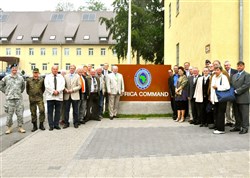Thirty emerging foreign leaders learned about U.S. military relations in Africa at U.S. Africa Command headquarters in Stuttgart, Germany June 8, 2011.
Mostly from Germany and France, the group of politically active visitors came to the command to gain a better understanding of the contributions made by U.S. forces in Europe and U.S. AFRICOM's role in the "whole of government" approach in Africa.
Command officials said hosting the event was a great opportunity to interact with potential leaders and share the command's mission.
"These meetings are critical for developing positive relationships with community members and citizens of other countries and regions who may not be familiar with U.S. Africa Command," said Major Charles Parada, U.S. AFRICOM's International Engagement Division deputy chief, who briefed the guests on international engagements. "They go a long way in helping them understand what the command is all about, which I feel is very important to the success of the command, because they carry that positive message back to others and it keeps growing exponentially."
Educated about U.S. AFRICOM's mission and activities during a mission brief, the visitors then had the opportunity to ask questions during a discussion with command staff who discussed the U.S. government approach to security issues, international military engagement, the role of public affairs and academic engagement.
While the visit was short, the group noted that what they learned was very enlightening.
"Thanks a lot," visitor Klaus Coenen told command staff. "[Learning about U.S. AFRICOM] is very interesting for me."
The group of leaders also toured German and French military sites, along with NATO and European installations and agencies.
Mostly from Germany and France, the group of politically active visitors came to the command to gain a better understanding of the contributions made by U.S. forces in Europe and U.S. AFRICOM's role in the "whole of government" approach in Africa.
Command officials said hosting the event was a great opportunity to interact with potential leaders and share the command's mission.
"These meetings are critical for developing positive relationships with community members and citizens of other countries and regions who may not be familiar with U.S. Africa Command," said Major Charles Parada, U.S. AFRICOM's International Engagement Division deputy chief, who briefed the guests on international engagements. "They go a long way in helping them understand what the command is all about, which I feel is very important to the success of the command, because they carry that positive message back to others and it keeps growing exponentially."
Educated about U.S. AFRICOM's mission and activities during a mission brief, the visitors then had the opportunity to ask questions during a discussion with command staff who discussed the U.S. government approach to security issues, international military engagement, the role of public affairs and academic engagement.
While the visit was short, the group noted that what they learned was very enlightening.
"Thanks a lot," visitor Klaus Coenen told command staff. "[Learning about U.S. AFRICOM] is very interesting for me."
The group of leaders also toured German and French military sites, along with NATO and European installations and agencies.





